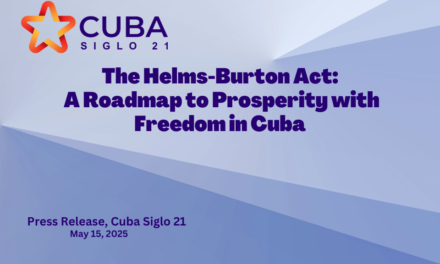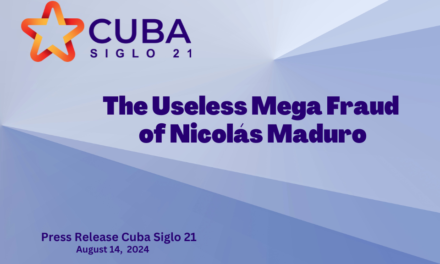(March 6, 2023) Cuba Siglo 21 releases the result of an investigation into the deliberate policy of asphyxiation unleashed by GAESA against the Cuban non-state sector – the so-called cuentrapropistas (self-employed) – since 2016. The report also addresses the Cuban government’s maneuvering behind the creation of Micro Small and Medium Enterprises (MSMEs) while with a thousand political prisoners and being proactive allies of Putin’s aggression against Ukraine, it fosters a campaign for the return of the United States to President Obama’s Thaw (Deshielo) policy.
The research published in the Dossier Cuba 21 collection was carried out with the support of the Havana Consulting Group, the Cuban Citizen Audit Observatory and the contributions of a group of independent journalists.
It shows statistically that the greatest boom achieved by the non-state sector occurred in the period 2013-2016, and then declined when in the midst of the Thaw the Cuban regime blocked the reforms and began a ruthless offensive to stop the largest movement of citizen entrepreneurship occurred in the last six decades.
According to the data, far from encouraging greater economic openness, the so-called Thaw (Deshielo) generated precisely the opposite: the oligarchy began a state offensive to asphyxiate entrepreneurs.
That offensive coincided, still under the Obama Administration, with the first denunciations by those affected by the so-called Havana Syndrome. The oligarchy benefited financially from the Thaw (Deshielo), cleaned up its foreign debt with the cancellation of 42 billion dollars, obtained new lines of credit, increased the flow of tourists and used the resources to build hotels and acquire equipment for repression. When the Covid – 19 epidemic came, there were no oxygen balloons, ambulances or hospitals prepared to deal with it. They did not stop the construction of hotels. Hundreds of thousands of Cubans died.
In 2016 there were more than 500,000 Cubans with self-employment licenses generating more than US$3 billion. The offensive against the previous reforms in 2016 took some 80,000 self-employed workers out of the market. Subsequently, the pandemic and the so-called Reordenamiento Monetario (Financial Reordering) made more than 139,000 entrepreneurs surrender the license or close their businesses. The country has lost two thirds of this labor force because the State, which now boasts of creating MSMEs that do not represent 1% of the preexisting businesses in 2016, has since applied deliberate policies to repress them by fiscal and police means (the most successful enterpreneurs often ended up in jail). A considerable part has emigrated convinced that there is no future.
The investigation reveals that the new MSMEs law was designed to redirect state-owned enterprises in order to create a business structure mostly managed by oligarchs and people related to the government. The objective is to facilitate the promotion in the United States of a Thaw (Deshielo) 2.0 by creating an image of false openness to attract foreign investment and circumvent the U.S. embargo. This would be an “entrepreneurial” middle class (with the discreet capital of the oligarchy and its ghost companies) that Cuba’s agents of influence in the US would try to promote and sell to OFAC (US Treasury Dept.) as legitimate private entrepreneurs and account holders to allow them commercial, financial and credit transactions with the US that would be mediated by the Cuban State and GAESA banks disguised as independent entities such as Orbit.
As this research shows, Cuba is a country where there is still no entrepreneurial freedom to register the ownership of a company, where it is not possible to export or import freely, nor to freely expand a business, nor to decide where to invest.
Under this reality, to try to outline a policy of engagement with the objective of empowering the Cuban people by trying to strengthen a private sector that does not exist, is to reiterate the mistakes of the first Thaw (Deshielo) that did not lead to giving oxygen to the people, but to their oppressors. Then concessions were made without claiming in exchange those that should materialize, first or in parallel fashion, on the Cuban side.
The indicator of success of any engagement shall be to empower people, not the oligarchs and GAESA. The governance regime of the totalitarian Mafia State has already collapsed and the majority of Cubans today want -and actually have the possibility- to remove their oppressors from power. Thus, no foreign interference aimed at strengthening them again at this juncture shall be welcome.
Dossier Cuba 21 No. 5 ENTREPRENEURSHIP IN CUBA SUFFOCATED BY GAESA







